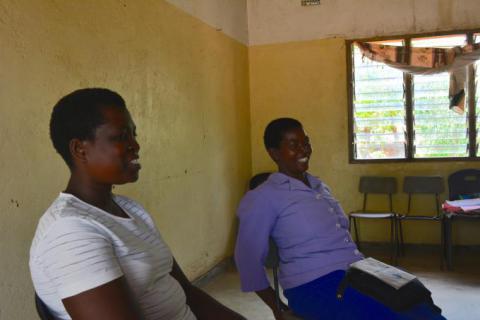Jessie Williams’ Story: Motherly Guidance in the Promotion of Girls’ Education
Mother groups have been a crucial community structure working with the Keeping Girls in School (KGIS) Project in facilitating the readmission of girl dropouts and supporting girl victims by reporting and referring cases of violence against children and the rehabilitation of victimized girls. Their outstanding work and solid commitment with the communities continues to ensure that no girl is left behind with their education. Jessie Williams from Salimu Village, Traditional Authority (TA) Chikowi in Zomba district is one of the remarkable mother group members and shares her story on what it means to be part of such a powerful group of women in her community.

Being part of a mother group is like a calling. It has its challenges and you always have to be on the move trying to find as may girls as possible who are in need of help. There are times when people laugh at us and say that we put our marriages at risk and waste time with other people’s business instead of minding our own. But we know what we do is helping a lot of girls and changing their lives. These girls that we help may even be the ones to assist me too some day when I am destitute.
The work we do requires someone with dedication and love for other people’s children. You have to travel long distances to different areas to counsel girls and convince parents to send their girls back to school when they drop out and sometimes we do not get positive responses from caregivers. However, we have improved our relationship with parents through our community awareness campaigns and our linkages with different structures. We have also been trained on how to handle girls to ensure that they value education and do not drop out of school.
In our group, we have goats that we sell to the community. The money that we get is what we use to help the girls when they require things that we can afford like text books, soap, body lotion and other things. We also brew thobwa, a local delicacy, as one of our fundraising activities to raise money and we have a piece of land that we farm on as a group. We are reaching out to more than 10 villages in the Chikowi area and through our interventions, five girls that dropped out because of pregnancies have gone back to school in the year 2016. Other girls that are currently pregnant, have also reserved school space for when they return.
We hold ‘Bwalo la Atsikana’ every month, where we meet girls and discuss issues like the dangers of premarital sex, abortions, how to dress properly and other issues that girls face. We also advise and visit girls who fall pregnant to encourage them to go back to school when they have their babies. In the past, getting pregnant meant a doomed future for girls but things have changed now.
There have been challenges that we continue to face though. For example, when a girl falls pregnant and decides to go back to school, there isn’t enough support given to her or the child to make it easier for her to stay in school. When she’s home she is able to breastfeed even an older child for months which is more nutritious and cheaper for the family, and the child tends to eat less since he is breastfed a lot. But when she has to go back to school, it means the child requires a lot more food other than breastmilk and usually the families do not have the ability to feed this child which creates challenges on how the child grows. We feel that such girls require other skills for them to be self-sufficient. They need to learn skills like tailoring whilst in school to enable them to make money on their own and take care of their children.
We also have challenges in accessing hard to reach areas where some girls are in need of our assistance. I also feel that the boys in schools need their own interventions since a lot of projects are only focusing on girls and this is making them bitter and frustrated, as a result sometimes they are not in full support of the girls.
Our plan in the near future is to organize a few exchange visits to other districts to learn from other mother group members on how they work – for us to improve on how we work too.
Written by Madalitso Mbendera, Communications & Advocacy Manager (Keeping Girls in School)
 Malawi
Malawi